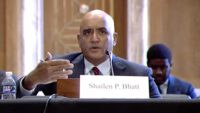As President Joe Biden’s administration shifts to implementing the array of carbon-cutting provisions, funding and incentives in the just passed climate change law, he also has revamped the team to lead the effort.
Biden on Sept. 2 announced he has named John Podesta, a long-time Democratic insider at the highest levels of government who also has experience in climate policy, to be the point person overseeing rollout of the $369 billion in the Inflation Reduction Act related to confronting climate change effects.
Officials say the provisions represent the largest federal commitment ever to try to reduce greenhouse gas emissions, with observers foreseeing significant opportunities for engineering and construction companies in the coming years in sectors ranging from power generation to buildings to highways.
The White House also announced that National Climate Advisor Gina McCarthy would step down from that post as of Sept. 16.
McCarthy, who led the US Environmental Protection Agency in the Obama administration and had been CEO of the Natural Resources Defense Council, was Biden's stated choice for the White House climate role in assuming it last year. Published reports from this spring said she had indicated privately her intention to serve in the administration for a short time.
McCarthy's successor will be her deputy, Ali Zaidi, who has played a key role in developing the administration's climate policy initiatives. He had been New York State''s chairman of climate policy and deputy secretary for energy and environment.
“John Podesta and Ali Zaidi are good picks by the White House,” Steve Hall, American Council of Engineering Companies senior vice president for advocacy and external affairs, told ENR via email. “Each brings executive experience that will be necessary to achieve the goals of the President’s climate strategy and the environmental goals" of the new law.
In announcing Podesta’s appointment Biden said “his deep roots in climate and clean energy policy and his experience at senior levels of government mean that we can truly hit the ground running to take advantage of the massive clean energy opportunity in front of us.”
He previously served as chief of staff for President Bill Clinton and counselor to President Barack Obama, which included coordinating the administration’s climate policy, according to the White House. He also chaired Hillary Clinton's 2016 presidential campaign.
Podesta leaves the Washington-based Center for American Progress, a nonprofit think tank that he founded and whose board he has chaired.
Heather Zichal, CEO of the American Clean Power Association, praised the selection of Podesta and Zaidi and noted the magnitude of the task they face.
Implementing the new legislation's climate provisions constitutes "the largest domestic investment in clean energy," Zichal said in a statement. Its implementation is "critical to building a clean energy economy that will benefit all Americans."
The job will involve keeping track of how multiple federal agencies distribute climate-related funding in various streams to states, localities and other recipients, and overseeing the measure's new and extended clean energy. tax incentives.
Along with provisions centered on renewable energy, hydrogen, critical minerals and carbon capture, the legislation also includes sections aimed at carbon reduction in federally-funded construction and for federal buildings.
One possible model for the new climate job is Biden's naming of former New Orleans Mayor Mitch Landrieu as implementation coordinator for the $1.2-trillion 2021 Infrastructure Investment and Jobs Act.
Landrieu faces pressure to get the money out rapidly and avoid misspending it. "We're going to go fast but we're not going to hurry," he has said.





Post a comment to this article
Report Abusive Comment